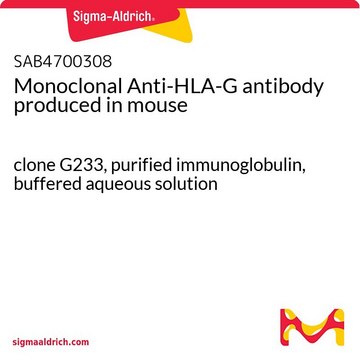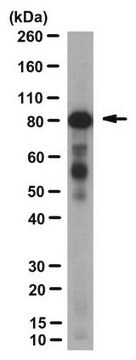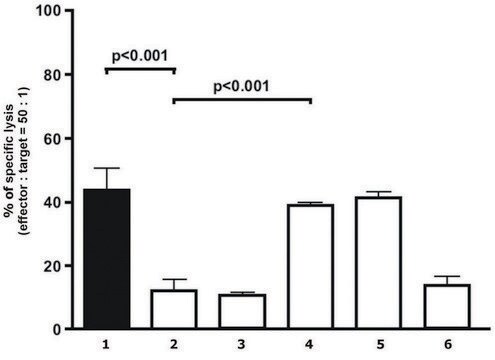SAB4700310
Monoclonal Anti-HLA-G antibody produced in mouse
clone MEM-G/9, purified immunoglobulin, buffered aqueous solution
Se connecterpour consulter vos tarifs contractuels et ceux de votre entreprise/organisme
About This Item
Code UNSPSC :
12352203
Nomenclature NACRES :
NA.41
Produits recommandés
Source biologique
mouse
Niveau de qualité
Conjugué
unconjugated
Forme d'anticorps
purified immunoglobulin
Type de produit anticorps
primary antibodies
Clone
MEM-G/9, monoclonal
Forme
buffered aqueous solution
Espèces réactives
human
Concentration
1 mg/mL
Technique(s)
flow cytometry: suitable
Isotype
IgG1
Numéro d'accès NCBI
Numéro d'accès UniProt
Conditions d'expédition
wet ice
Température de stockage
2-8°C
Modification post-traductionnelle de la cible
unmodified
Informations sur le gène
human ... HLA-G(3135)
Catégories apparentées
Description générale
The antibody MEM-G/9 reacts with native form of human HLA-G1 on the cell surface as well as with soluble HLA-G5 isoform in its beta2-microglobulin associated form. HLA-G belongs to the MHC Class I molecules (MHC Class Ib; nonclassical) and it is expressed on the surface of trophoblast cells. The antibody MEM-G/9 is standard reagent thoroughly validated during 3rd International Conference on HLA-G (Paris, 2003).
Immunogène
Recombinant human HLA-G refolded with beta2-microglobulin and peptide
Application
The reagent is designed for Flow Cytometry analysis. Suggested working dilution is 2 μg/mL of sample. Indicated dilution is recommended starting point for use of this product. Working concentrations should be determined by the investigator.
Caractéristiques et avantages
Evaluate our antibodies with complete peace of mind. If the antibody does not perform in your application, we will issue a full credit or replacement antibody. Learn more.
Forme physique
Solution in phosphate buffered saline, pH 7.4, with 15 mM sodium azide.
Clause de non-responsabilité
Unless otherwise stated in our catalog or other company documentation accompanying the product(s), our products are intended for research use only and are not to be used for any other purpose, which includes but is not limited to, unauthorized commercial uses, in vitro diagnostic uses, ex vivo or in vivo therapeutic uses or any type of consumption or application to humans or animals.
Vous ne trouvez pas le bon produit ?
Essayez notre Outil de sélection de produits.
Code de la classe de stockage
10 - Combustible liquids
Point d'éclair (°F)
Not applicable
Point d'éclair (°C)
Not applicable
Faites votre choix parmi les versions les plus récentes :
Déjà en possession de ce produit ?
Retrouvez la documentation relative aux produits que vous avez récemment achetés dans la Bibliothèque de documents.
Jay M Bolnick et al.
Fertility and sterility, 102(1), 135-142 (2014-05-16)
To use trophoblast cells accumulating in the endocervical canal at the beginning of pregnancy for noninvasive prenatal testing. Prospective, double-blinded test for fetal gender. Academic medical center. Fifty-six women with singleton pregnancies at gestational age 5-20 weeks. Isolation of fetal
Ana S López et al.
Molecular immunology, 43(14), 2151-2160 (2006-02-24)
Dendritic cells (DC) are strong inducers of immunity but they can also be tolerogenic. During monocyte differentiation to DC the immunosuppressive indoleamine-2,3-dioxygenase (IDO) is induced. IDO degrades Trp to kynurenine, which is further metabolized to 3-hydroxyanthranilic acid. DC can also
Nele Gao et al.
Arthritis & rheumatology (Hoboken, N.J.), 66(10), 2849-2861 (2014-06-20)
B cells with immunoregulatory properties (Breg cells) have been described in mice, but their role in the control of human immune responses is not well defined. We recently identified a human population of activated FSC(high) B cells that exhibited regulatory
Natasja Nielsen et al.
Immunology, 142(4), 581-593 (2014-03-29)
Rheumatoid arthritis (RA) is an autoimmune disease characterized by chronic inflammation and synovial hyperplasia leading to progressive joint destruction. Fibroblast-like synoviocytes (FLS) are central components of the aggressive, tumour-like synovial structure termed pannus, which invades the joint space and cartilage.
Notre équipe de scientifiques dispose d'une expérience dans tous les secteurs de la recherche, notamment en sciences de la vie, science des matériaux, synthèse chimique, chromatographie, analyse et dans de nombreux autres domaines..
Contacter notre Service technique








